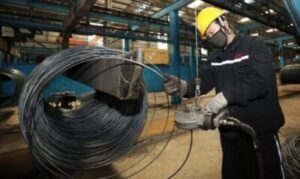>>REAL-TIME UPDATES IN THE WIRE. CLICK HERE<<<
China’s factory-gate prices grew at their fastest pace since July 2018 in March as producers passed on rising raw material prices and consumer prices returned to inflation for the first time in three months.
Producer price index (PPI) rose 4.4 per cent in March from a year earlier, the National Bureau of Statistics (NBS) said on Friday, well above a 3.5 per cent rise forecast in a Reuters poll and accelerating sharply from a 1.7 per cent gain in February.
“From a month-on-month perspective, affected by factors such as rising international commodity prices, PPI rose by 1.6 per cent month-on-month, an increase of 0.8 percentage points from the previous month,” said Dong Lijuan, a senior statistician at the NBS.
Price increases in raw materials accounted for around 3.4 percentage points of the March PPI and the carryover effect from last year another 1 percentage point, said Dong.
Within PPI, the price in ferrous metal smelting and rolling processing industry rose by 21.5 per cent year over year, accelerating by 7.4 percentage points from the previous month, while the prices in the non-ferrous metal smelting and rolling processing industry increased by 21.3 per cent year on year, up 9.2 percentage points. The prices in the chemical raw material and chemical product manufacturing industry rose by 11.4 per cent compared to a year earlier, accelerating by 7.4 percentage points from a month ago.
The prices in the oil and natural gas extraction industry rose by 23.7 per cent year on year, while the oil, coal and other fuel processing industries rose by 13.9 per cent.
The PPI reading was inline with official data released last week which showed the country’s manufacturing activity expanded at the fastest pace in three months in March as factories ramped up production to keep up with improving global demand.
“Markets may become increasingly concerned about pressures from rising inflation on Beijing’s policy stance, but we expect Beijing will stick to its ‘no sharp policy shift’ commitment,” said Ting Lu, chief China economist at Nomura.
Lu expected annual PPI inflation to rise to around 6 per cent mid-year and “moderate thereafter.”
China’s consumer price index (CPI) rose 0.4 per cent from a year earlier in March, the statistics bureau said in a separate statement, beating a median forecast for a 0.3 per cent rise in a Reuters poll and returning to inflation after two months of price falls. CPI fell 0.3 percent year on year in January and 0.2 percent in February.
“From a year-on-year perspective, due to the significant weakening of the negative impact of carry-over factors, the CPI went from a drop of 0.2 per cent in the previous month to a rise of 0.4 per cent,” said the NBS.
“In terms of month-on-month, due to the seasonal fall in demand after the Spring Festival, the CPI went from an increase of 0.6 per cent month-on-month in the previous month to a 0.5 per cent decrease in March.”
Falling food prices, especially for pork, continued to drag on consumer inflation last month, the NBS said.
The price of pork – a staple meat on Chinese dinner tables – plunged 18.4 per cent compared to a year earlier, with the rate of decline expanding by 3.5 percentage points from the previous month.
Non-food prices rose 0.7 per cent in March year on year, up from a reading of 0.2 per cent in February.
China has set a modest growth target of above 6 per cent for this year, but analysts widely expect growth of more than 8 per cent after 2.3 per cent growth in 2020. That was the weakest full-year reading in over 40 years as China grappled with the fallout from the COVID-19 pandemic.
Beijing has warned that uncertainties related to the pandemic, which has claimed more than 3 million lives worldwide, continue to overshadow the economic outlook.


